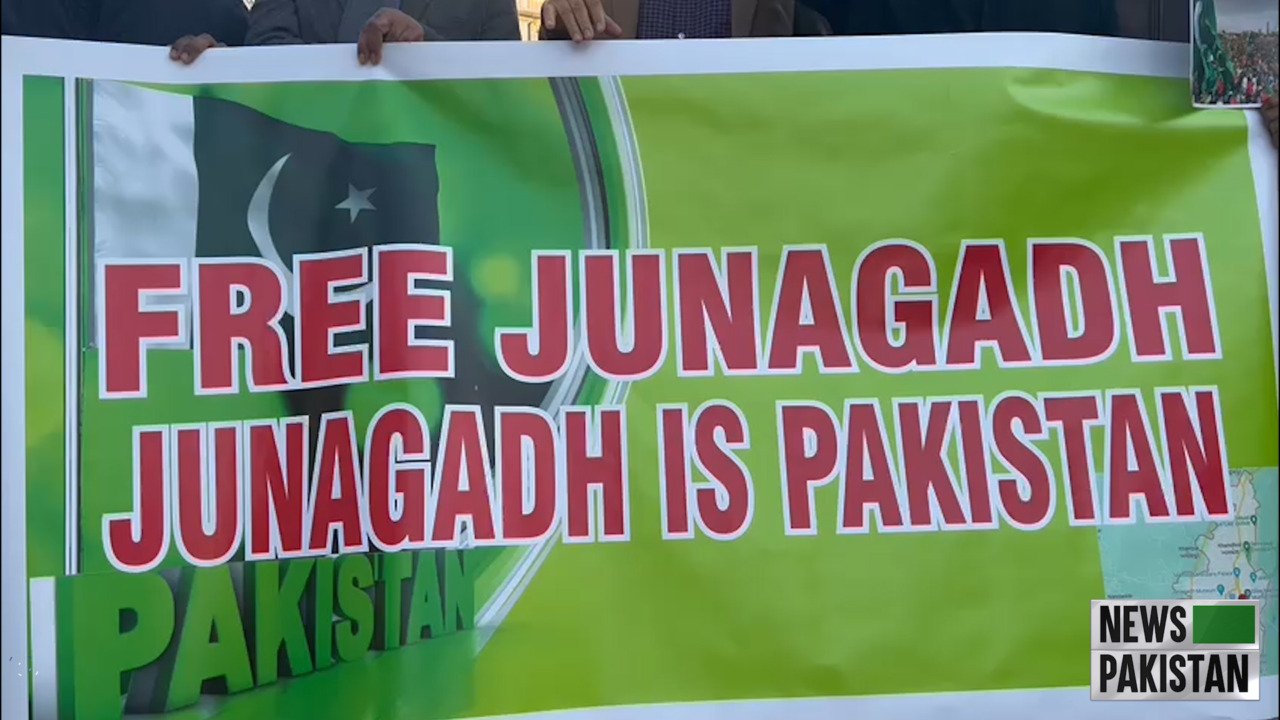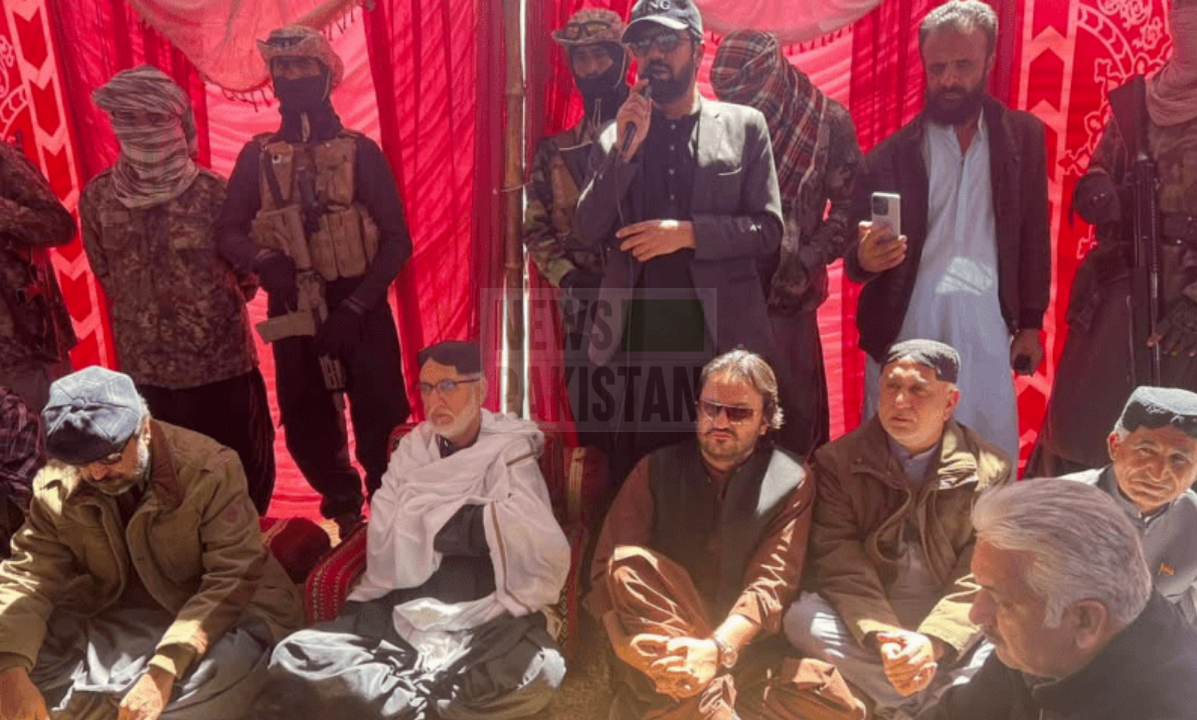ISLAMABAD: FO has maintained on Thursday (5th September, 2024) that Junagadh was annexed to Pakistan.
According to the FO: “The country sees this matter in historical and legal perspective. Junagadh was a part of Pakistan and India’s illegal occupation of it is a violation of the United Nations Charter and international norms…
Pakistan has always been raising the Junagadh issue at political and diplomatic forums and wants a peaceful solution to it. Pakistan also considers the Junagadh issue as an unfinished agenda like Indian Illegally Occupied Jammu & Kashmir (IIOJK).
PARIS: A group of Pakistanis based here recently converged to demand annexation of Junagarh to Pakistan.
They raised slogans asking Freedom for Junagarh saying Junagarh was Pakistan. It may be recalled that back in 1947, soon after Partition, India not only occupied Jammu and Kashmir but also occupied Muslim State of Junagadh by force.
Despite its agreement for accession to Pakistan in 1947, the Muslim-ruled Junagarh state remains under illegal Indian occupation for the last 74 years.
The geostrategic importance of Junagarh and access to the Arabian Sea give it unique importance for a regional trade route.
According to an analytical report by Kashmir Media Service, Junagarh had the unique dispensation of being the second-largest among Muslim states and a rich one, ranked fifth in terms of revenue generation among the 561 British India princely states.
It was one of the major princely states of British India with an area of around 4000 square miles and its own standing army besides a proper system of governance.
However, India illegally occupied it in a blatant violation of ‘Article 26’ of the ‘Vienna Convention of law on treaties.
Citing the historical facts, the report said Nawab Mohabat Khanji, the then governor of Junagarh reached an agreement with Quaid-i-Azam Muhammad Ali Jinnah, Governor-General of Pakistan and signed the ‘Instrument of Accession.
It was the first princely state to accede to Pakistan on 15 September, 1947. As the Nawab of Junagarh visited Karachi to discuss procedural details concerning accession, India advanced its troops and occupied the state on November 9, 1947.
However, Quaid-e-Azam Muhammad Ali Jinnah approached the UN Nations for the redressal of the issue in January 1948. The UN Security Council ordered its commission on Kashmir to examine the conflict over Junagarh. However, the case still remains unresolved.
“The state is an integral part of Pakistan lawfully as there is a genuine ‘Instrument of Accession’ duly signed by Nawab of Junagarh and Quaid-i- Azam Muhammad Ali Jinnah,” the report adds.
India claimed that on basis of population, it was rightful in occupying Junagarh despite the fact that the Nawab had signed a legally authentic Instrument of Accession with Pakistan.
“The fact is India is illegally holding both Kashmir and Junagarh in violation of international laws and the Partition plan,” the report remarked. Being an international issue, it had also been raised at the UN in 1948 by the then Pakistan’s foreign minister.
The Muslims of Junagarh still observe 9th November, 1974, as a black day of Indian occupation in their homeland.
On 5th August, 2020, Pakistan had approved and released the new political map of Pakistan, which includes territories of Jammu and Kashmir and a part of Ladakh.
The map also included Junagarh, Manavadar and Sir Creek in Indian Gujarat as part of Pakistan. At the time of partition, Pakistan was facing many challenges including the lack of resources, no organised army and influx of refugees and it was not in any position to retaliate Indian aggression.
The Nawab, together with his household, left the state by the end of October to Karachi, leaving the state administration in the hands of the Dewan.
Late Nawab of Junagarh Mohammad Jahangir Khanji appealed to Prime Minister Imran Khan to become an ambassador of Junagarh as he did in the case of Kashmir and highlighted the issue of liberation of the state from Indian occupation at all international forums.
Pakistan’s claim has a legal standing in the eye of international law and the UN must act accordingly to ensure protection of Muslim citizens of the state and peaceful resolution of this long-standing territorial disputes between the two state.
Radio Pakistan Adds: PARIS: A group of Pakistanis based in Paris recently converged to demand annexation of Junagarh to Pakistan. They raised slogans asking Freedom for Junagarh saying Junagarh was Pakistan. It may be recalled that back in 1947, soon after Partition, India not only occupied Jammu and Kashmir but also occupied Muslim State of Junagadh by force.
(APP) Despite its agreement for accession to Pakistan in 1947, the Muslim-ruled Junagarh state remains under illegal Indian occupation for the last 74 years.
The geostrategic importance of Junagarh and access to the Arabian Sea give it unique importance for a regional trade route.
According to an analytical report by Kashmir Media Service, Junagarh had the unique dispensation of being the second-largest among Muslim states and a rich one, ranked fifth in terms of revenue generation among the 561 British India princely states.
It was one of the major princely states of British India with an area of around 4000 square miles and its own standing army besides a proper system of governance.
However, India illegally occupied it in a blatant violation of ‘Article 26’ of the ‘Vienna Convention of law on treaties.
Citing the historical facts, the report said Nawab Mohabat Khanji, the then governor of Junagarh reached an agreement with Quaid-i-Azam Muhammad Ali Jinnah, Governor-General of Pakistan and signed the ‘Instrument of Accession.
It was the first princely state to accede to Pakistan on 15 September, 1947.
As the Nawab of Junagarh visited Karachi to discuss procedural details concerning accession, India advanced its troops and occupied the state on November 9, 1947.
However, Quaid-e-Azam Muhammad Ali Jinnah approached the UN Nations for the redressal of the issue in January 1948. The UN Security Council ordered its commission on Kashmir to examine the conflict over Junagarh. However, the case still remains unresolved.
“The state is an integral part of Pakistan lawfully as there is a genuine ‘Instrument of Accession’ duly signed by Nawab of Junagarh and Quaid-i- Azam Muhammad Ali Jinnah,” the report adds.
India claimed that on basis of population, it was rightful in occupying Junagarh despite the fact that the Nawab had signed a legally authentic Instrument of Accession with Pakistan.
“The fact is India is illegally holding both Kashmir and Junagarh in violation of international laws and the Partition plan,” the report remarked.
Being an international issue, it had also been raised at the UN in 1948 by the then Pakistan’s foreign minister.
The Muslims of Junagarh still observe November 9, 1974, as a black day of Indian occupation in their homeland.
On August 5, 2020, Pakistan had approved and released the new political map of Pakistan, which includes territories of Jammu and Kashmir and a part of Ladakh. The map also included Junagarh, Manavadar and Sir Creek in Indian Gujarat as part of Pakistan.
At the time of partition, Pakistan was facing many challenges including the lack of resources, no organised army and influx of refugees and it was not in any position to retaliate Indian aggression.
The Nawab, together with his household, left the state by the end of October to Karachi, leaving the state administration in the hands of the Dewan.
Recently, Nawab of Junagarh Mohammad Jahangir Khanji appealed to Prime Minister Imran Khan to become an ambassador of Junagarh as he did in the case of Kashmir and highlighted the issue of liberation of the state from Indian occupation at all international forums.
Pakistan’s claim has a legal standing in the eye of international law and the UN must act accordingly to ensure protection of Muslim citizens of the state and peaceful resolution of this long-standing territorial disputes between the two states.
Newspakistan.tv

Sahibzada Ateeq is a Paris-based correspondent of Newspakistan.tv who covers diplomatic, political, social, art and cultural events in France.




